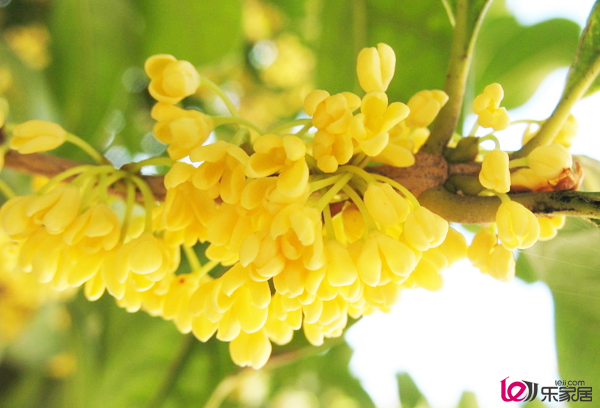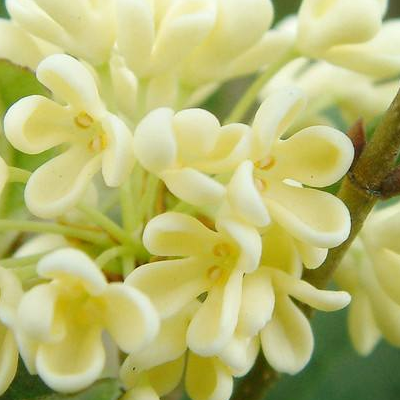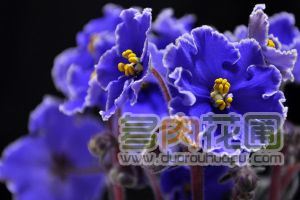Planting method of Osmanthus fragrans
Sweet-scented osmanthus tree planting method, sweet-scented osmanthus tree, also known as rhinoceros, rock cinnamon, golden millet and so on. When it is in full bloom, it is full of yellow flowers, overflowing with the wind, fragrant and refreshing, with the praise of "monopolizing Sanqiu pressure Zhongfang, he Kua orange green and orange yellow". In addition, its economic value is also high, flowers can be used as raw materials for food processing, such as soaking wine, making tea, making all kinds of cakes and so on. Its fruit, root, flower and so on can be used as medicine, so it has been loved by people for thousands of years.
Sweet-scented osmanthus is an evergreen tree species, which is native to northwest China. It is cultivated in Henan, Gansu, Shandong, Sichuan, Yunnan, Guizhou, Jiangsu and Zhejiang provinces, and has a long history of cultivation. It is said that sweet-scented osmanthus trees are more than a thousand years old in Shaanxi and Guizhou. In recent years, the number of professional greening and mass greening growing sweet-scented osmanthus in Shanghai is also increasing. In addition to silver osmanthus, cinnamon, cinnamon and so on, most of them are four seasons osmanthus, among which a kind of willow leaf osmanthus suitable for potted plants has also been listed in Shanghai.
The habit of sweet-scented osmanthus trees, like light, cold resistance, higher requirements for the environment, the ground should choose dry terrain, fresh air, no soot and other pollution, otherwise, it will be difficult to grow and blossom. For the sandy soil that is loose, rich in humus and slightly acidic, clayey or alkaline soil is avoided. Keep a certain space (distance) around the tree when planting, and do not overlap and squeeze the branches and leaves to facilitate ventilation and light, otherwise, it will also affect the growth and flowering.
In order to make sweet-scented osmanthus trees grow well and blossom, it is very important to add nutrition reasonably. Adequate base fertilizer should be applied in winter (December to January of the following year). The method is to trench around the root base and fill in sufficient organic fertilizer, such as rotten cake fertilizer plus animals (or bone powder, calcium superphosphate), and feces such as pigs and sheep can be used in rural areas. so that the new side branches thrive, conducive to the future multi-pregnant buds. Once more topdressing in July, organic fertilizers based on phosphorus and potassium or 0.5% urea were added with 2% superphosphate to promote the prosperity of autumn flowers. If there is not enough fertilizer, it will blossom less or not.
In addition to the above two points, we should also pay attention to daily maintenance, such as cutting off dead branches at any time. Diseased branches, weak branches, over-dense branches and short long branches, etc., so that their nutrition is concentrated, more buds are pregnant, and more flowers are bloomed; it is necessary to prevent the soil from being too dry or too wet, and avoid stagnant water after rain, so as to prevent rotting roots and leaves and affect flowering; and to loosen the soil and keep the ground clean, and control diseases and insect pests. In particular, the "leaf cutter", also known as "night lark", which nibbles on the leaves of sweet-scented osmanthus, can be sprayed with 1/1000 trichlorfon after discovery.
In addition, the transplanting time of sweet-scented osmanthus trees should be from March to April or in autumn after blooming. Pot or tank planting methods are basically the same as above, and the above is the planting method of sweet-scented osmanthus trees.
Characteristics of Osmanthus fragrans planting techniques of Osmanthus fragrans
Sweet-scented osmanthus tree is an evergreen broad-leaved tree, I believe everyone is no stranger to it, because we usually drink sweet-scented osmanthus tea, eat sweet-scented osmanthus cake are made of sweet-scented osmanthus. Sweet-scented osmanthus tree is elegant, with green branches and green leaves, it is a kind of evergreen plant, can send out a pleasant fragrance of flowers, osmanthus fragrance is like this. The following is to introduce the characteristics of Osmanthus fragrans.

Of course, the characteristics of sweet-scented osmanthus trees are first of all in terms of shape. The sweet-scented osmanthus tree is very tall, the highest can reach 15 meters, and the crown is so large that it can cover an area of 400 square meters. Sweet-scented osmanthus trees have luxuriant branches and leaves, and generally bloom in autumn. When they bloom, the aroma is overflowing, and the fragrance can be smelled vaguely from far away. The root system of sweet-scented osmanthus tree is quite developed and can grow in deep underground.
The characteristics of sweet-scented osmanthus tree should also be seen from its living habits. Osmanthus fragrans is native to the Himalayas in southwest China, and wild sweet-scented osmanthus is also grown in Sichuan, Yunnan, Hunan and other places. Sweet-scented osmanthus trees can withstand high temperatures and like to grow in warm and humid areas. Osmanthus trees do not pick soil, except for some alkaline soil and soil with poor drainage, they can grow healthily.
Osmanthus fragrans can be divided into August osmanthus, four seasons osmanthus and cinnamon, among which eight osmanthus can be divided into gold cinnamon and silver cinnamon. The flower of cinnamon is easy to fall off and is one of the most commonly planted; the flower of cinnamon is stronger and its fragrance is lighter; cinnamon is the most fragrant but the most expensive one; the four seasons cinnamon is named because of its blooming in the four seasons and is loved by everyone.
The planting methods of sweet-scented osmanthus trees can be divided into balcony planting and courtyard planting. Balcony planting should select young seedlings and put them in flowerpots with small holes in the basin, and then apply a small amount of fertilizer many times. When planting in the courtyard, you need to dig a nest in the courtyard, pat the soil tightly after burying it, and apply fertilizer for a small number of times. You can also "reshape" the sweet-scented osmanthus tree and repair it into a spherical or umbrella shape, all of which are extremely beautiful.
Conclusion: as the saying goes, sweet-scented osmanthus blossoms, fragrance floats ten miles. Isn't this the characteristic of sweet-scented osmanthus trees? People often call magnolia, begonia, peony and sweet-scented osmanthus as the four traditional famous flowers. They are planted together in front of the courtyard, taking the homonym of jade, hall, wealth and expensive, which has an auspicious meaning. Such a beautiful sweet-scented osmanthus, who can not like it?
▏ lover grass ▏◇
Planting techniques of potted Osmanthus fragrans planting techniques and points for attention of potted sweet-scented osmanthus trees
August is filled with the fragrance of sweet-scented osmanthus, his breath of its beauty so that many people can not forget now, so many people slowly fell in love with the charming fragrance of sweet-scented osmanthus. Nowadays, many people plant sweet-scented osmanthus trees at home. Do you know the planting skills and precautions of sweet-scented osmanthus trees? let's follow our editor to see how to cultivate sweet-scented osmanthus trees.
Sweet-scented osmanthus tree is evergreen all the year round, and its branches are luxuriant. It blossoms in autumn, and it can be known as "monopolizing three Autumn to press Qunfang". It is widely used in gardens, often as landscaped trees, some solitary planting and some opposite planting at the same time. Sweet-scented osmanthus trees after continuous artificial cultivation, there are several kinds of sweet-scented osmanthus trees, such as cinnamon, cinnamon, silver osmanthus and four seasons osmanthus. Cinnamon, golden osmanthus and silver osmanthus all bloom in autumn and can be collectively called August osmanthus.
The conservation technology of sweet-scented osmanthus trees is in summer, the newly planted sweet-scented osmanthus trees should be watered thoroughly, and in the flowering period in the middle of September, appropriate watering should be taken to keep the soil moist, thin fertilizer should be applied frequently, quick-acting nitrogen fertilizer should be given priority to, reasonable pruning, and photosynthesis should be strengthened. reduce diseases and insect pests.
When potted sweet-scented osmanthus is watered, it will not be dry or watered, but it will be thoroughly watered. If the temperature is high in summer, the amount of water should be large. The temperature is above 25 degrees and it is watered every afternoon. Keep the soil and air moist when sweet-scented osmanthus blossoms and spray more water on the leaves to increase the relative humidity of the air.
The attention of potted sweet-scented osmanthus is to choose slightly acidic soil first; at the same time, watering should be timely, and the principle of "two less and one more" should be grasped; manure should be applied skillfully every 10 days in spring, thin rotten chicken, duck manure or fish mixed water should be applied after July, and liquid fertilizer dominated by phosphate fertilizer should be applied at the beginning of September; proper pruning. More information: | what are the functions of mulberry leaves? | how to grow irises? Iris picture display | introduction to the culture method of lovegrass | | what are the culture methods of thousand days red? | talk about the method of high-pressure propagation of azaleas | Platycodon grandiflorum flower picture display | | radiation-proof flowers, what flowers can protect against radiation | how to raise iron trees? The culture method of iron tree | is the fairy ball protected against radiation? |
- Prev

Grafting method of Osmanthus fragrans
Osmanthus fragrans grafting method, sweet-scented osmanthus grafting, mainly branch grafting. In Wuhan and Nanjing, the best grafting period is from late March to April. At this time, the rootstock began to find new buds, the sap flowed and healed quickly after grafting.
- Next

How to raise potted violets
How to raise potted violets? Pot violets should choose dwarf varieties. After sowing and emergence, the seedlings were planted with long oval cotyledons, light green cotyledons, wavy edges of true leaves, large and obvious defects. The reoperation rate of this kind of seedling is high, and the price of cut flowers is much higher than that of individual plants. Violet taproot plant with underdeveloped fibrous roots
Related
- Fuxing push coffee new agricultural production and marketing class: lack of small-scale processing plants
- Jujube rice field leisure farm deep ploughing Yilan for five years to create a space for organic food and play
- Nongyu Farm-A trial of organic papaya for brave women with advanced technology
- Four points for attention in the prevention and control of diseases and insect pests of edible fungi
- How to add nutrient solution to Edible Fungi
- Is there any good way to control edible fungus mites?
- Open Inoculation Technology of Edible Fungi
- Is there any clever way to use fertilizer for edible fungus in winter?
- What agents are used to kill the pathogens of edible fungi in the mushroom shed?
- Rapid drying of Edible Fungi

